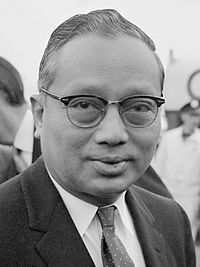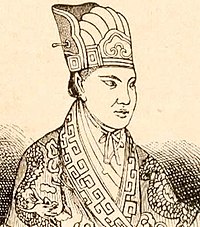Politics of Orioni
 | |
| State type | Unitary parliamentary constitutional monarchy |
|---|---|
| Constitution | Constitution of Orioni |
| Legislative branch | |
| Name | Sibiseba |
| Type | Unicameral |
| Appointer | Direct election |
| Executive branch | |
| Head of State | |
| Title | Empress |
| Currently | Joni I Nabérrie |
| Head of Government | |
| Title | Chairlady |
| Currently | Awidefale Rezovi |
| Cabinet | |
| Name | Imperial Council |
| Current cabinet | Rezovi I |
| Ministries | 12 |
| Judicial branch | |
| Name | Judiciary of Orioni |
 |
|---|
| This article is part of a series on the politics and government of Orioni |
The politics of Orioni take place with the framework of a parliamentary democracy under a constitutional monarchy in which the monarch, currently Empress Joni, is the head of state while the Chairperson of the Memakiriti, currently Awidefale Rezovi, is the head of government. Orioni has been described as a bureaucratic monarchy where legally the power lies in the hands of the monarch, but the real power lies in the hands of the bureaucracies surrounding her. The Orinese Constitution provides for a separation of powers. The political system of Orioni consists of an executive branch, a legislative branch, and a judicial branch.
Executive power is exercised by the Chairperson of the Imperial Council (Oharic: Memakiriti). The Government consists of the Chairperson and councillors. The government, including the Chairperson, can be revoked by the Sibiseba. The Sibiseba (Anglish: Assembly) passes statutes and votes on the budget; it controls the action of the executive through formal questioning on the floor of the houses of Sibiseba and by establishing commissions of inquiry. The Orinese political system is a multi-party system. Former executive leaders are members of the Sibiseba. The judiciary is based upon the civil law system and operates independently from the executive and the legislative branches. The highest court is the Imperial Court of Orioni.
History
An early executive branch was the Imperial Council (Oharic: Memakiriti). At its creation in 1175, it was composed of four councillors or advisors, with the monarch representing the fifth decisive vote. The position of “Councillor” (abbreviated as Cllr) was appropriated from city government and carried over to the national level. The title precedes the holder's other titles, for example Cllr Andrew Pipkin. Each councillor was the head of a specialized department and a geographical area of expertise (several provinces). The monarch would open her personal correspondence and discuss hearings only in the presence of at least 2 councillors. They provided council to the monarch, and confirmed (or co-signed) and accelerated royal decisions (edicts and declarations). The Council was considered a very important body of government. The various councillors were still subject to the crown. Some historians even consider it to be more important than the Monarchy itself.[citation needed] The four original departments were:
- Councillor of the Household: oversaw the royal entourage, clergy, affairs of the capital, royal buildings, and personal military guard.
- Assisted by the Keeper of the Seals.
- Councillor of the Sword: First Officer of the Crown, and highest commander of the army, oversaw border provinces.
- Assisted by the Master of the Horse.
- Councillor of the Ships: highest commander of the navy, oversaw colonial matters.
- Assisted by the Admiral of the Galleys.
- Councillor of Mediation: oversaw diplomacy, foreign relations and trade.
- Assisted by the Collector of the Tithe.
In 1195 new laws were introduced to celebrate 20 years of restoration. An early legislative branch was formed as part of the constitutional law reforms, transforming the monarchy into a more deliberative form. The Gizatochi was an early precursor to the Sibiseba. This institutionalised assembly critiqued monarchical decisions, discussed laws about taxes, trade, diplomacy, and military matters. It was a select committee that included fifty noble representatives from the Tamanyi cities. These nobles were the heads of all important families. However, as the population grew, the Gizatochi became more and more dysfunctional, as feuds between families crippled its functioning. In later centuries, this was expanded to include representatives from other cities as well. Nevertheless, colonial possessions were not represented.
Monarchy
National government
The country is organised with separation of powers. A strong, centralized government is necessary to maintain order and prevent conflict in society. However, a single ruler or group should not have complete control over all aspects of government. Therefore, government powers are separated into different branches, with each branch having specific responsibilities and powers. The legislative branch of government is responsible for making laws, the executive branch is responsible for enforcing laws, and the judicial branch is responsible for interpreting laws. This separation of powers prevents any one branch from becoming too powerful and helps to ensure that the government acts in the best interests of the people.
Executive
Imperial Council
The Imperial Council (Oharic: Memakiriti) has been the de facto executive cabinet for most of the country's modern history. It led by the Chairperson and supported by councillors. The councillors are responsible for heading a government department. The council is the supreme state advisory body to the Monarch, and advises her on policy matters. The council consists of 12 councillors, chaired by 1 chairperson, and is divided over three topical sub councils. It meets to discuss matters of state in the capital city of O'polis. The current Rezovi Government, a two-party cabinet since 2019, consists of a coalition of the left-wing Socialist Party of Orioni and centre-left Blueropa.
- Chairlady of Imperial Affairs: Awidefale Rezovi
- Subcouncil for Power (Oharic: Hayili)
- Home Affairs: Dame Nijo Kujo-Michiie
- Foreign Affairs: Anna Hackney
- Justice: Lady Amuh Nideba
- Defence: Prince Toren Nabérrie
- Subcouncil for Profit (Oharic: Idigeti)
- Treasury: Lady Catherine Manzoni
- Economy: Sir Hiram Hiramson
- Energy: Prof. Elisa Solna
- Trade & Transportation: Countess Elisabeth of Hakushaku
- Subcouncil for Prosperity (Oharic: Hizibi)
- Health: Prof. Bobo Lang
- Social Services: Dr. Ianos Mikasa
- Environment: Sir Constantine Vogels
- Education: Lady Mihaeli Timos
- Subcouncil for Power (Oharic: Hayili)
| Chairlady of Imperial Affairs: Awidefale Rezovi | ||
Subcouncil for Power (Oharic: Hayili)
|
Subcouncil for Profit (Oharic: Idigeti)
|
Subcouncil for Prosperity (Oharic: Hizibi)
|
Chairperson
The executive branch is led by the Chairperson, supported by councillors. The Chairperson is the Monarch's deputy as the head of government, and assumes the role of chairing the Council. They are elected by the legislative Sibiseba. In Orinese politics, the Chairperson is equivalent to that of a prime minister. S/he heads the imperial council and lead of the councillors in the executive branch of government.
| Portrait | Name (Birth–Death) |
Took office | Left office | Political party | Elected | Notable credit(s) |
|---|---|---|---|---|---|---|
 |
Mrs Lusiya Selami ina Gitiri (1878-1967) |
1951 | 1955 | Constitutional Party | 1951 | Establishment of Europan Commercial Alliance; decolonisation of Burkini. |
 |
Mrs Louam Zemichael ina Yessuf (1883-1960) |
1955 | 1959 | Constitutional Party | 1955 | Dealing with the economic crisis of 1958. |
 |
Mrs Hawa Nega (1896-1987) |
1959 | 1963 | Constitutional Party | 1959 | $Credit(s) |
 |
Mrs Elshaday Berta ina Aman (1901-1975) |
1963 | 1967 | Constitutional Party | 1963 | $Credit(s) |
 |
Mrs Yekirigizi Sinetsihufi (1912-1997) |
1967 | 1975 | WPO | 1967 1971 |
Recovery from Second Argic War. |
 |
Mrs Betesida Leul (1907-1988) |
1975 | 1979 | WPO | 1975 | Recovery from economic crisis. |
 |
Mrs Beza Menkir Alem (1911-2004) |
1979 | 1983 | Motherland Movement | 1979 | $Credit(s) |
 |
Mrs Eleni Arame (1918-2019) |
1983 | 1987 | Liberal Homeland Party | 1983 1991 |
$Credit(s) |
 |
Mr Hano Ketenya (1924-2020) |
1987 | 1991 | WPO | 1987 | $Credit(s) |
 |
Mrs Eleni Arame (1919-2007) |
1991 | 1995 | Liberal Homeland Party | 1983 1991 |
$Credit(s) |
 |
Mrs Salayish Ciris (1937-) |
1995 | 2003 | Blueropa | 1995 1999 |
Infrastructure projects[1] |
 |
Mrs Chandra Pristo (1952-) |
2003 | 2007 | SPO | 2003 2015 |
Establishment of Entente of Oriental States |
 |
Mr Ionas Strupar (1970-2016) |
2007 | 2015 | PO&N | 2007 2011 |
Various economic and military projects[2] |
 |
Mrs Chandra Pristo (1952-) |
2015 | 2019 | SPO | 2003 2015 |
Financial recovery; hosting the 2018 UENA World Cup; Green Shift; STEM grants; Strategic petroleum reserves[3]; expansion of EOS. |
 |
Ms Awidefale Rezovi (1975-) |
2019 | Incumbent | SPO | 2019 | Bainbridge Islands peacekeeping; 5G rollout; establishment of CAOS. |
Legislative
The Sibiseba (“assembly”) is the unicameral legislative body of Orioni. It meets in O'polis, the capital of Orioni. The main advantage of this unicameral system is more democratic and efficient lawmaking. The legislative process is simpler, without deadlock between two chambers, and reduces costs. The Sibiseba cannot be dissolved. The Sibiseba has ultimate legislative power, and no other government institution can over-ride its decisions. Neither the Monarch nor the executive branch participates in the legislative process. The Sibiseba exists as the peacekeeping body between the different provinces within the Empire. Whenever a dispute between provinces is brought up, the Sibiseba votes on the issue based on what was best for the population as a whole. In recent years the Sibiseba's powers have come to include all important matters of state, including its representation in international organisations, declarations of war against an enemy, and offering military and technological aid to an ally.
Orinese nationals aged 25 years and older may run for office in the Sibiseba. Orinese nationals aged 20 years and older may vote. Prior to 1991, the voting age was 21. Each sibisebali represents a single constituency within the empire. Sibisebali serve a four-year term. The number of constituencies is re-evaluated before each election, thus altering the number of sibisebali every four years. In 2021 there are 162 sibisebali, elected to a four-year term. 82 seats are required for a majority. The Constitution instituted the membership by right (senator de drept) in the Sibiseba for:
- (1) the heir to the throne;
- (2) heads of state-recognised religious bodies;
- (2) the president of the Andro Academy;
- (2) former chairpersons of the Imperial Council;
- (5) former councillors with at least five years’ seniority;
- (2) former high judges of the Imperial Court of Justice;
- (0) former supreme commanders of the IODF.
Judicial
Based on the ancient Aroman system of αλήθεια (alítheia, truth).
- Imperial Court of Justice on the national level
- Palace(s) of Justice on the provincial (kifile) level
- House(s) of Justice on the departmental (wereda) level
- Table(s) of Justice on the municipal level
Weekly agenda
- Monday: Interpellation of the executive branch by the legislative branch.
- Tuesday: Sibiseba meets for legislative work.
- Wednesday: Review of legislative branch by the judicial branch.
- Thursday: Subcouncils meet for executive work.
- Friday: Memakiriti meets for executive work.
Local government
Political parties and elections
According to its constitution, Orioni has a multi-party political system. However, in practice, the Constitutional Party was the long-time ruling party and dominated the Orinese political arena up until the late 1960s. Second was the Modern Orioni Party, created to organize popular support for the monarchy after the failed coup d'état of 1928. In the 1940s, the Workers Party arose to represent the emerging working class. These three groups still control Orinese politics, but they have changed a lot.
(WIP. Why does the Socialist Party have so much political power in a monarchy like Orioni? As one of the last monarchies in Oriental Europa, concessions had to be made to keep the population happy. Pressure and examples from neighbouring countries are causing more social policies to seep in. The toleration of a limited socialist policy is necessary for the monarchy to survive, without slipping into a dictatorship as in Ide Jima.)
Types
Alliances
(Senior partner. Junior partner. Centrist alliance. Right-wing alliance.)
Policy making
Foreign Relations
Men in government

In Orioni, men have historically been underrepresented in the government and different institutions. Their role has traditionally been relegated to business and military positions, both at domestic and abroad. This inclination has changed in the 20th century, with more men also pursuing leadership positions within the Orinese political sphere. As of September 2021, the participation rate of men in government stands around 33%. The following male leaders are considered pioneers.
- 1917: the first male diplomat was Mr Tomeniko Anāsa, ambassador to Mekabiri.
- 1921: the first male mayor was Baron Liyoni Kinigiyariti of Iwineti.
- 1929: the first male Sibisebali was Mr Luchi Sifira.
- 1951: the first male councillor was Mr Bizati Mekakelenya-Korebita, who served as Defence Councillor under Chairlady Lusiya Selami ina Gitiri.
- 1987: the first male chairperson was Mr Hano Ketenya.
Terminology
- CL: Chairlady, leader of the executive branch of government. Originally, for a male Chairperson the title of Chairlord was proposed. However, the first man in this position, Hano Ketenya, was a member of the Workers Party of Orioni and preferred the less aristocratic title of Chairman.
- CM: Chairman, see CL.
- Cllr: Councillor, member of the executive branch of government.
- IC: Imperial councillor, see Cllr.
- MS: Member of the Sibiseba, the legislative branch of government.
- Sibisebali: see MS.
References
- ↑ Bullet train from O'polis to Zuidhaven (15 February 2016)
- ↑ Big Story News, Secret submarine plans (21 February 2016)
- ↑ Roiters, Government to build up storage of petroleum (25 November 2018)



